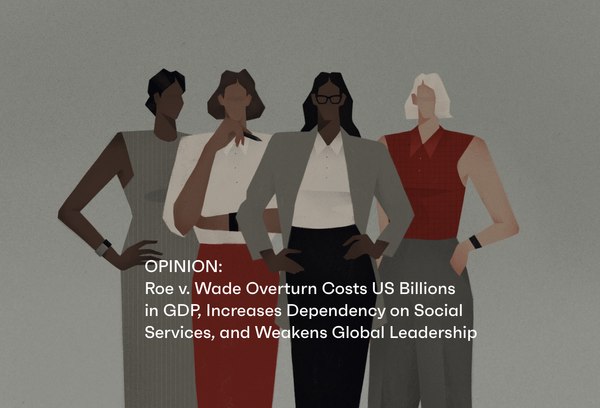Conversations about fertility in the workplace remain heavily stigmatized. In fact, fertility-related discussions are so discouraged that it may surprise readers that infertility is more common than Type 2 Diabetes in the U.S. Yet pervasive biases surrounding motherhood prevent many employees from discussing their fertility journeys for fear of discrimination or retribution. After all, in many workplaces, the motherhood penalty persists, leaving many mothers on the job paid and respected less than their non-mother colleagues.
The silence surrounding employees’ fertility decisions exacerbates problems already endemic to infertility. According to the Fertility Network, 90% of individuals seeking fertility treatment experience depression. The perceived inability to discuss fertility decisions with co-workers can contribute to an employee’s feeling of isolation — even if, in reality, their managers and colleagues would be highly supportive.
To proactively assert their supportiveness and advocate for fertility-based discussions, leaders must foster a work culture prioritizing health and wellness. The beginning of that journey will differ from organization to organization, but all leaders should consider implementing solutions that demonstrate action over words. For example, offering fertility-related benefits, including but not limited to in vitro fertilization (IVF), egg freezing and surrogacy, will encourage employees to discuss fertility decisions with their managers openly.
Once employees are comfortable discussing their fertility decisions, the culture at work will shift — and improve — in several ways. Here's why employers should open the floodgates and prioritize open conversations with their employees today.
Family-friendly employers retain and attract talent easier
Organizations reputed to be family-friendly reap many benefits, including the opportunity to attract top talent and retain them for longer. Conversations about family-building are far more natural in an environment where health and fertility-related decisions have been actively encouraged by inclusive benefits. Case in point: several Stork Club customers advertise their family-building benefits during the hiring process, with many reporting that applicants increasingly value and inquire about these offerings.
And the benefits of family-building solutions extend beyond the application process to increase employee tenure. Nearly 90% of women who undergo IVF treatment paid by their employer return to work after childbirth, compared to just 50% of women who pay for treatment out-of-pocket.
Additionally, fertility benefits are becoming more standard, especially at top companies. As a result, employees are rightfully requesting more from their employers. Almost half of U.S. applicants cite fertility benefits as a necessary offering from any new employer. In other words, many employers have already lost top employees due to outdated offerings.
Access to fertility care creates a happier, more productive workforce
By proactively touting fertility solutions, employers also signal to existing employees that their work culture is open to perhaps-difficult conversations. This expectation is important because employees undergoing fertility treatment require guidance and oversight from clinical professionals and well-intended friends, family, and colleagues.
Out-of-pocket expenses related to fertility can take a severe toll. A single round of IVF costs up to $30,000, and most individuals must undergo multiple rounds to become pregnant. In 2020, nearly three-fourths of Americans (72%) reported experiencing finance-related stress, especially after making a large purchase. And in the case of fertility decisions, financial uncertainty compounds existing stressors, leaving many employees feeling dissatisfied, isolated, and unable to work at the top of their abilities.
The benefit of an open workplace is twofold here. First, in a workplace that prioritizes family-building solutions, employees are free to make fertility decisions unburdened by financial stress. This creates a more engaged and active workforce. Second, as conversations about fertility become more common, employees are more likely to feel a sense of belonging. Studies show happy employees are up to 20% more productive.
Family-building solutions and conversations create a more equitable workplace
Studies show Black women are twice as likely to experience infertility yet far less likely to seek treatment. Black women often experience heightened feelings of shame and isolation, inequitable access to fertility benefits, and physician prejudice. Furthermore, many clinics neglect to offer Black sperm or egg donors.
Similarly, LGBTQ+ individuals face several barriers to fertility treatment. A 2022 study from the AAMC Center for Health Justice found that more than half of LGBTQ+ birthing persons experienced bias or discrimination during their clinical journey, while 61% report experiencing mental health difficulties (compared to just 34% of cisgender or heterosexual birthing persons).
Because employers are the top healthcare provider in the U.S., they are responsible for addressing biases in care. To do so, employers must offer truly inclusive family-building benefits and encourage a culture that values openness, honesty, and belonging — regardless of race, gender identity, or sexual orientation. Workplaces that uphold robust diversity, equity, and inclusion (DEI) initiatives are also more productive and efficient. Most importantly of all, these workplaces invite all employees to come as they are, encouraging a diversity of thought and opinion that creates better, more innovative solutions.
At Stork Club, access to critical reproductive healthcare is a basic human right. Join us on the mission to make reproductive care available for all. Interested in adding Stork Club to your team? View a demo with us here.
Each week Stork Club tackles industry insights on fertility, workplace inclusion & DEI initiatives.
If you’re not a subscriber, here’s what you missed this month:
- How Stork Club Designs its Offerings to be Diversity, Equity, and Inclusion (DEI)- Friendly
- Stork Club fully offsets carbon emissions
- How to close gaps in family-building care for your black employees




